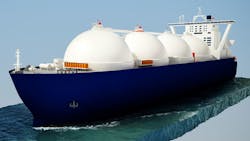API: Energy 'Superpower' US Needs to Move Now on LNG Exports
Government approval of pending applications for liquefied natural gas export terminals would help diversify energy sources for U.S. allies and provide hundreds of thousands of jobs in America, according to an American Petroleum Institute official.
“For the first time in generations, the United States is an energy superpower,” Erik Milito, API’s director of upstream and industry operations, told a press conference call. “And the world – especially Europe and countries like Russia, China, and India – is watching closely to see if American policymakers are ready to harness that power on the international stage.”
Some 20 applications to build LNG export facilities are pending with the Department of Energy. The department has approved six terminals since 2011. Moving ahead with the terminals and ramping up LNG exports could provide up to 665,000 jobs by 2035, according to a study by ICF International.
The ICF study, released on November 14, projected that LNG exports could contribute as much as $10 billion to $31 billion per state to gas-producing states such as Texas, Louisiana and Pennsylvania. It also found that states with large manufacturing bases such as Ohio, California, New York and Illinois would also see significant economic gains.
The long lead time to permit and approve the LNG facilities should not be a deterrent to taking action quickly, said Milito, addressing criticism that these approvals would do little to ease the situation facing the Ukraine and other European nations heavily dependent on Russia for natural gas and oil.
“First, market signals are incredibly powerful -- provided the market believes that we will do what we say we will do,” he said. “And second, what geopolitical crisis 10 or 20 years from now will draw the same comments, if we stand by today and watch others seize the opportunity?”
Milito noted that Hungary, Poland, Slovakia and the Czech Republic had sent a letter on March 8 to House Speaker John Boehner (R-OH) urging the U.S. to increase exports of natural gas.
Increased natural gas exports would not have a harmful effect on the domestic market, Milito claimed. He cited a report by NERA Economic Consulting for the Energy Department which found that “the market for LNG exports is self-limiting, in that little or no natural gas will be exported if the price of natural gas in the US increases much above current expectations.” Milito said that was because “the cost of liquefying and exporting gas creates a natural price buffer, while multiple studies confirm that production will increase as the market expands.”
Milito said that if DOE were to move now to approve all pending applications and other regulatory approvals were obtained, the first shipments could occur in 2016 and significant exports could take place by the end of the decade.
Another reason for the U.S. to move quickly, Milito said, is that the U.S. faces significant international competition to build export facilities.
“Over 60 non-U.S. facilities are currently planned or under construction, and those nations that act quickly to attract these investments will reap the rewards,” he said.
About the Author
Steve Minter
Steve Minter, Executive Editor
Focus: Leadership, Global Economy, Energy
Call: 216-931-9281
Follow on Twitter: @SgMinterIW
An award-winning editor, Executive Editor Steve Minter covers leadership, global economic and trade issues and energy, tackling subject matter ranging from CEO profiles and leadership theories to economic trends and energy policy. As well, he supervises content development for editorial products including the magazine, IndustryWeek.com, research and information products, and conferences.
Before joining the IW staff, Steve was publisher and editorial director of Penton Media’s EHS Today, where he was instrumental in the development of the Champions of Safety and America’s Safest Companies recognition programs.
Steve received his B.A. in English from Oberlin College. He is married and has two adult children.
